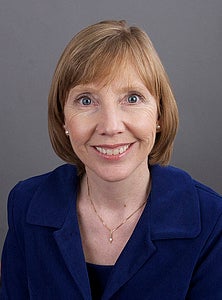Barbara Bohach

Biography
Education: Ed.D., Curriculum and Instruction, University of Northern Iowa; M.A.E., Elementary Reading and Language Arts, University of Northern Iowa; B.S., Elementary Education, Viterbo College
Barbara earned her undergraduate degree in elementary education with a minor in special education from Viterbo College in La Crosse, WI. She received her masters degree in elementary reading and language arts as well as her doctorate in curriculum and instruction and from the University of Northern Iowa in Cedar Falls, IA. After teaching in an elementary classroom for eleven years, Barb started teaching undergraduate courses for elementary majors in reading, language arts, social studies methods, and general teaching strategies with computer applications at Luther College.
I believe our survival as a society hinges on how effective we are at raising our children to be citizens of the world. To this end, society needs effective teachers at every level. Teachers have to be good thinkers who are able to peel away the layers of distractions in this world and really question the value and integrity of what they are being asked to do in today’s classrooms. Teachers have to be passionate learners who can share their excitement for wondering with children, and teachers have to be caring individuals who pull children up to their potential through support and encouragement. Teachers have to realize the critical role they can play in children’s lives, because teachers do make a difference.
“One looks back with appreciation to the brilliant teachers, but with gratitude to those who touched our human feelings. The curriculum is so much necessary material, but warmth is the vital element for the growing plant and for the soul of the child.” – Carl Jung
EDUC 320 Introduction to Reading
Based on a synthesis of research identifying characteristics of highly effective reading teachers, this course focuses on five pillars of effective reading instruction: teacher knowledge, classroom assessment, effective practice, differentiating instruction, and family/community connections. Special attention is paid to language acquisition, phonics and word identification, fluency, vocabulary, comprehension and reading assessment.
EDUC 326 Elementary Language Arts Methods
This course is an introduction to oral and written communication for the twenty-first century, the curriculum and pedagogy of a language arts program based on standards established by the International Reading Association and the National Council of Teachers of English, and the eight components of the language arts in the elementary classroom. It will include integration of the language arts (to include reading/literature, writing/grammar, speaking, viewing, listening and spelling), the use of technology in teaching language arts, and classroom management as it applies to language arts instruction.
EDUC 347 Assessment in Special and Remedial Education
This K-12 course is an introduction to the assessment process using specific protocols for formal assessment, special education legal guidelines concerning assessment, interpretation of assessment data, the use of such data in instructional planning and basic technical aspects of assessment. There is a significant emphasis on literacy skill evaluation, and this course is required of all students seeking the Instructional Strategist II: behavior disorders/learning disabilities and/or reading endorsement.
EDUC 321 Clinical Experience II: Literacy in Elementary/Middle School
As a part of the elementary/middle school education sequence the student observes and teaches small and large groups of students in a classroom in the area of literacy. During the clinical experience the student develops and teaches a unit that documents the planning, teaching, assessment and reflection of literacy protocols.
EDUC 322 Clinical Experience II: Mathematics in Elementary/Middle School
As a part of the elementary education methods sequence the student observes and teaches small and large groups of students in an elementary/middle school classroom. During the clinical experience, the student develops and teaches a unit that documents planning, teaching, assessment and reflection protocols in the area of mathematics.
- Ed.D., Curriculum and Instruction, University of Northern Iowa, 2004
- M.A.E., Elementary Reading and Language Arts, University of Northern Iowa, 1994
- B.S., Elementary Education, Viterbo College, 1981